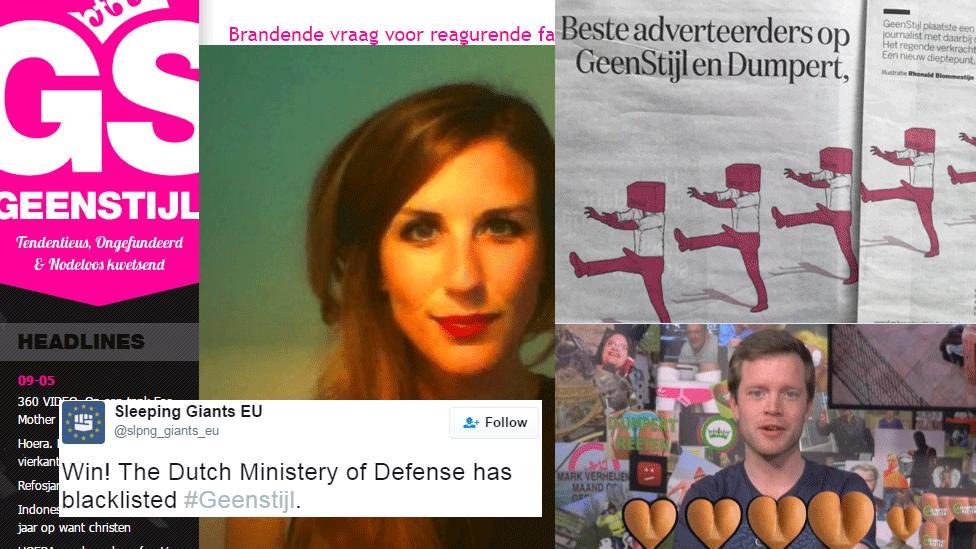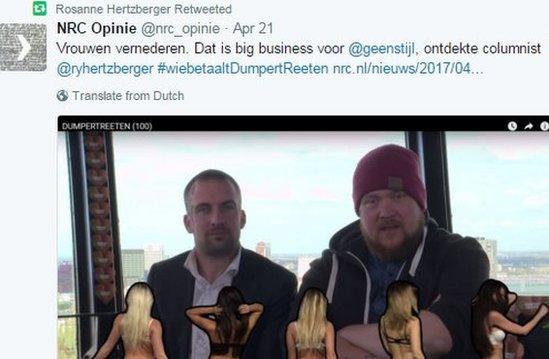Women's protest hits Dutch website with ad boycott
- Published

One particular Geenstijl article (top L) prompted the open letter (top R) and several leading brands have responded
A Dutch shock blog has been hit by an advertising boycott, after a campaign launched by more than 140 women.
TV journalists, columnists, politicians and a leading economist signed an open letter accusing GeenStijl of denigrating women and online intimidation, as well as racism and homophobia.
They accused big brands such as Rabobank and the Efteling theme park as well as the Dutch ministry of defence of "paying the salaries of the most influential trolls on the internet".
Now several advertisers have responded by pulling their ads, including the brewer Grolsch, the furniture store Ikea and the Dutch tax office.

Among the women signing the letter were ex-politician Femke Halsema, TV host Eva Jinek and economist Heleen Mees
GeenStijl has been shock-blogging for 14 years and describes its stance as "tendentious, unfounded and gratuitously offensive".
So why call for a boycott now?
The row began when columnist Rosanne Hertzberger wrote an article critical of companies that advertised on the site.
"You can reduce naked women to stage props," she wrote, external. "I find it revolting but for me freedom goes quite a long way. The question is which advertisers are making this content possible."
When another columnist, Loes Reijmer, added her voice to the criticism, Geenstijl's editor Bart Nijman posted a photo of her on the site, asking readers "Would you do her?"

"Denigrating women. That's big business for @geenstijl, finds columnist @ryhertzberger"
That unleashed an army of aggressive, often anonymous, trolls.
Their comments were graphic. They included threats to rape or inflict twisted forms of sexual assault and other violent acts. Most are too grotesque or offensive to publish here.
This time the website had crossed a line, the women decided, and the public boycott campaign was launched, external. Among those signing the open letter were:
TV host Eva Jinek
Ex-Green leader Femke Halsema
Author Myrthe Hilkens
Economist Heleen Mees
They urged advertisers to end their relationship with GeenStijl, as they had a responsibility to customers not to "support a site where the humiliation of women and racism is the norm, not the exception".
They asked them to consider whether appearing in this kind of environment was in line with the values of their companies.
Education Minister Jet Bussemaker and several other politicians have backed the women and told Dutch TV they had to "take a stand" to protect women from being pilloried online.
Politicians from the liberal D66 and Green-Left parties raised the issue in parliament and now several companies and government ministries have voted with their feet.
Rabobank told the BBC it placed adverts where it expected to reach the desired audience and no longer used GeenStijl's video-sharing sister site Dumpert.
What is GeenStijl?
A small but influential blog, it attracts almost 2m unique visitors a month and has 88,000 followers on Twitter.
Critics say it is racist, sexist, unashamed click bait and offers "a place for pathetic people to vent their frustrations".
But its readers argue it is refreshing and a political correctness-free zone.

Dutch Education Minister Jet Bussemaker was among several political figures to back the women's campaign
Its bloggers promote themselves as protectors of free expression and are proud of their position as provocateurs.
By way of a disclaimer it once wrote a relatively tame article about me, referring to me as a "Page Three girl", including a holiday snap that has since been removed.
GeenStijl is also part of the Telegraaf Media Groep (TMG), one of the largest media organisations in the Netherlands.
Is this censorship?
GeenStijl itself has responded with a blog accusing politicians of trying to censor it.
One former editor on the site, Annabel Nanninga, said sexism was being used as an excuse to shut it down because it had been "a thorn in the eye" for 14 years.
One TV presenter has condemned the support for the anti-GeenStijl campaign as "terrifying". By "naming and shaming" advertisers, the columnists were not only jeopardising the blog's income but its very existence.
"I readily remind my profession that moral indignation is always selective," warned Roderick Veelo.
Today it was GeenStijl, he suggested, but tomorrow it would be another and before you knew it it could be your turn.
- Published20 February 2017